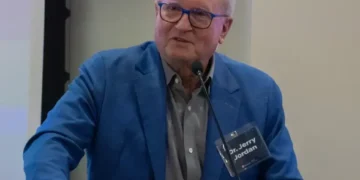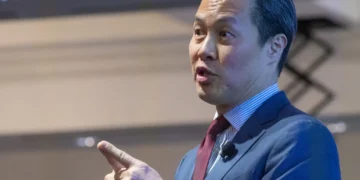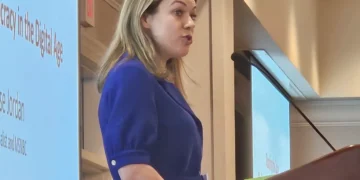On Jan. 31, the William Winter Institute for Racial Reconciliation announced its relocation to Jackson, reconstituting it as an independent nonprofit organization and expanding its statewide operations after almost two decades on the campus of the University of Mississippi.
Established in 1999, after the national 1997 One America Initiative, the Winter Institute seeks the “end of all discrimination based on difference,” and its successes at the university have been significant.

In 2004, the Institute supported Philadelphia, MS citizens pursuing justice for the 1964 ‘Mississippi Burning’ murders, and in 2006, it successfully lobbied the Mississippi Legislature to establish the Mississippi Civil Rights Education Commission and mandate K-12 civil rights education. It also invested in reconciliation initiatives in Northern Ireland and South Africa.
In an interview with the Daily Journal, Chancellor Jeffrey Vitter said, “The maturation of the institute is an example of the highest calling of our university: to take a bold concept, cultivative it and empower it to achieve great good in society.”
The institute now has a new executive director as well as a new location. Portia Espy, former William Winter Institute director of communications and field operations, accepted the job in April.
“Sometimes you need to go out on your own,” Espy said. “Relocating was a decision we made, and I would say the move was amicable.”
Administrative leaders reportedly supported the institute’s relocation, but former executive director of the institute Susan Glisson said the truth is not so black-and-white.
“Relocation came up several times over the course of my employment. It always centered on the lack of financial support for our work and a lack of alignment in vision about what the institute’s work should be,” Glisson said. “Reconciliation must encompass justice and systematic equity, and those were not concepts that were ever fully embraced.”
During her time at the institute, Glisson said there were complicated, oft-oppositional institutional relationships.
“Half of my job as director involved fighting and pushing UM administrators to let us do the work that Gov. Winter and our history called us to do,” she said.
Glisson said she remembers times when UM leadership interfered with the institute’s work.
“The first time I spoke to former UM Chancellor Robert Khayat, he called to ask me not to use the word racism in a press release about a student summit on ‘Race and Racism,’” Glisson said. “He said the word made folks upset.”
Glisson said that Khayat sought to limit the institute’s involvement in the 2005 ‘Mississippi Burning’ trial.
“When a private donor asked us to host their anonymous gift that would provide a reward for information leading to an arrest in that case … (Khayat) said no, that the institute should be ideologically neutral,” Glisson said.
She said that “when white supremacist Richard Barrett wanted to speak on campus and students wanted to protest, I was called into Khayat’s office to talk the students out of it.” Glisson claims she and former General Counsel Lee Tyner dissuaded Khayat.
“That student protest has long been celebrated in UM’s history and was the model for students in 2009 when the (Ku Klux) Klan came to campus,” Glisson said.
Glisson said the work of the Winter Institute changed the national narrative surrounding the school and that Khayat accredited the success of the 2008 U.S. presidential debate to “the presence and work of the institute,” but that, barring exceptions, “UM never raised money for the institute. I had to fight to keep the Office of Research and Sponsored Programs from taking percentages of (outside funds).”
However, the university’s relationship with the institute was not without its triumphs.
“The most important benefit of the partnership was in our relationship to students. Young people enlivened and challenged us,” Glisson said. “And (former Chancellor Dan Jones) was intellectually curious about the issues and willing to engage in difficult dialogue and really gave us the freedom to grow.”
During his 2010 investiture, Jones uplifted reconciliation as “his focus as chancellor,” Glisson said.
“Jones understood that ‘UM had a ‘special obligation’ to address our unique racial history and be welcoming,”she said.
However, Glisson said the campus became more hostile toward the institute once “Dr. Jones’ contract was not renewed.
“I was a ‘rule breaker’ and ‘trouble,’” Glisson said.
She resigned as executive director in 2016.
“No one asked me to leave. I chose to do so, hoping that my leaving would enable my team to thrive with new leadership,” she said.
Responding to inquiries about the institute’s relocation, an administrative spokesperson offered this statement: “In Dec. 2017, the William Winter Institute for Racial Reconciliation became an independent, nonprofit organization located in Jackson. This formation allowed the institute to take an increased advocacy role and promote synergies with the new Mississippi Civil Rights and Mississippi History Museums in the state capitol.”
The institute said it is expanding its statewide partnerships.
“Relocating in the heart of Mississippi allows for greater work with other organizations and state entities, like (the Museum of Mississippi History and the Mississippi Civil Rights Museum) and the Mississippi Museum of Art,” Espy said.
She said the institute still hopes to work with the University of Mississippi.
“We’re willing to work with any educational institution that wants to work with us,” Espy said.
Now, the question is whether or not the University of Mississippi is willing to work with the William Winter Institute.





































